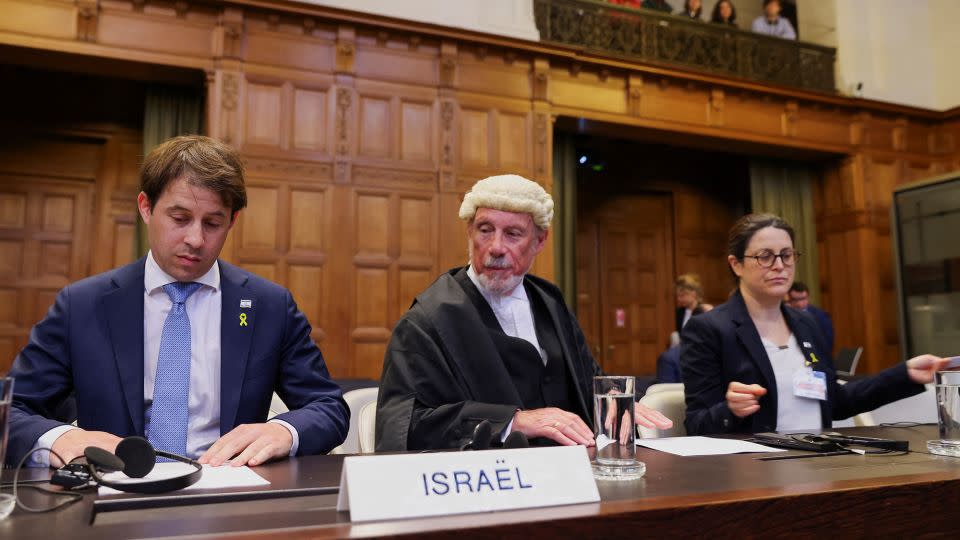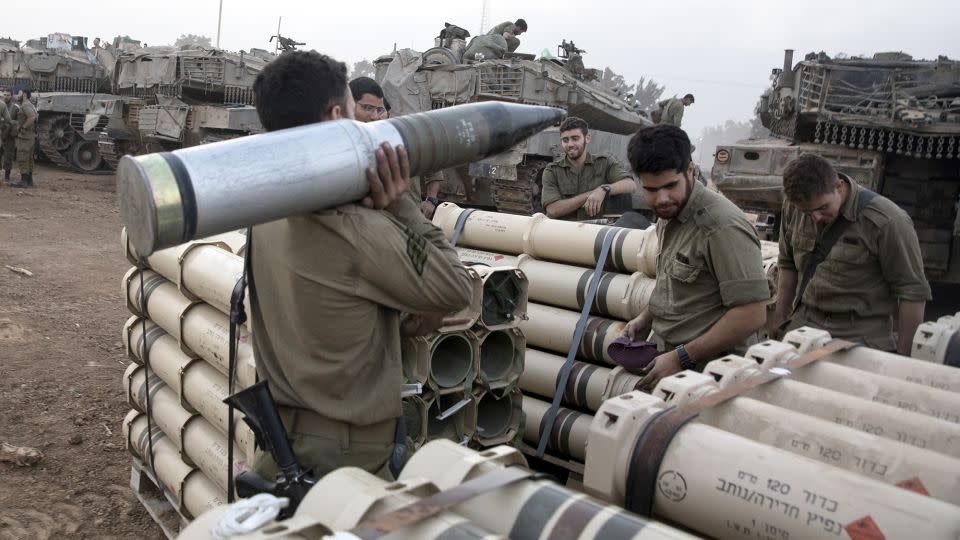What seven more months of war would mean for Palestinians, Israelis and the world
Editor’s Note: A version of this story appears in CNN’s Meanwhile in the Middle East newsletter, a three-times-a-week look inside the region’s biggest stories. Sign up here.
Israel has warned that its war in Gaza could extend until the end of the year. National Security Adviser Tzachi Hanegbi stated on Wednesday that the country anticipates “seven more months of fighting” to achieve its objective of destroying Hamas, a goal that remains unmet after more than seven months of conflict.
Prolonging the war could have catastrophic consequences for Palestinians in the already ravaged territory and significant repercussions for Israel and beyond, experts said. It could further harm Israel’s economy, influence its domestic politics, and damage its international standing and foreign relations. It could also impact US politics, particularly as President Joe Biden gears up for the November elections.
“It’s a grueling grind forward,” said Assaf Orion, a senior research fellow at the Institute for National Security Studies (INSS) in Tel Aviv and former head of the Israel Defense Forces (IDF) strategic planning division. “We see the day-in, day-out toll of that kind of fighting… On top of that, there is of course the political, diplomatic, informational and reputational issues, in which Israel is paying growing costs for the ongoing fight.”
Here’s what seven more months of war could mean.
More suffering for Palestinians
The situation is deteriorating by the day inside Gaza and a continuation of the war is likely to significantly increase the suffering of the people there.
In February, when the death toll in the territory stood at 28,000, researchers from the London School of Hygiene & Tropical Medicine (LSHTM) and the Johns Hopkins Center for Humanitarian Health projected that if the war escalated the total number of deaths would surpass 72,000 by August. If the impact of epidemics sparked by the conflict is included, the toll could be close to 86,000 by then.
Aid agencies have warned that civilians in Gaza are suffering from famine in parts of the enclave and that more airstrikes and more displacement in the south of the strip are only compounding the humanitarian crisis.
Delivering much-needed aid into the territory is incredibly difficult. The amount of humanitarian aid entering Gaza dropped by 67% after Israel launched its military offensive in Rafah earlier in May, the United Nations warned this week.
“We once again call for a ceasefire and the release of all hostages,” said Juliette Touma, director of communications at the UN Relief and Works Agency for Palestine Refugees (UNRWA). “The longer this war goes on the more there is suffering for Israeli and Palestinian civilians.”
Netanyahu’s fate
Experts suggest that both Hamas and Israeli Prime Minister Benjamin Netanyahu see benefits in prolonging the war, as their political survival depends on it. A post-war scenario is unlikely to feature either party: Israel has pledged to destroy Hamas, and Netanyahu may face accountability for failing to prevent the October 7 attacks that triggered the conflict. Additionally, new elections in Israel could potentially unseat the longtime prime minister.
“Most Israelis support early elections, the largest proportion of which want elections as soon as the war is over,” said Yohanan Plesner, president of the Israel Democracy Institute. “So, in this sense, an extended war might delay elections and therefore postpone Netanyahu’s day of reckoning with the voters.”
A majority of Jewish Israelis would be willing to bear the burden of continued fighting for at least six months, Plesner told CNN, citing data from a survey conducted between March 31 and April 3. “So, Israelis are ready for sustained fighting – the question is who they want leading them.” A significant majority of Israelis believe that the time has come for those responsible for the failures of October 7 and the war to step down, he added.
The Israeli leader has so far refused to take responsibility for the war, stating that such questions will be addressed only after the military achieves its goals: the release of hostages and the elimination of Hamas.
Israel has lost 292 soldiers in Gaza since it began its ground offensive there, which came in retaliation to Hamas’ October 7 attack that killed 1,200 people and kidnapped more than 250 others, according to Israeli officials. More than 36,000 people have been killed in Gaza since, according to the health ministry in the territory.
Netanyahu also faces intense pressure from hardline members of his fragile coalition to continue the war. Some have threatened to quit the government if he accepts a ceasefire deal before Hamas is eliminated.
Israeli diplomacy
Israel’s diplomatic isolation could grow if the war drags on. The government has become the target of increased censure on the world stage, drawing sharp criticism from some of its closest allies in Europe for its conduct.
It has withdrawn envoys from three European nations, in response to them formally recognizing a Palestinian state, and had several South American and other countries downgrade diplomatic relations.
Legal action could also escalate. Netanyahu is facing a potential arrest warrant by the International Criminal Court over some of Israel’s actions in Gaza, and Israel is facing a genocide case at the International Court of Justice. That court has ordered Israel to halt its military operation in Rafah, a legally binding order that Israel has so far ignored.

An extended war may also further delay prospects of normalization with Saudi Arabia, something Netanyahu singled out as a priority for his government before the October 7 attack. This conflict has derailed those efforts and the Jewish state has come under harsh criticism from Riyadh, as well as other Arab states that already have diplomatic ties with Israel, including Egypt and the United Arab Emirates. Egypt, the first Arab nation to recognize Israel, has warned its neighbor against stationing troops so close to its border. At least one member of Egyptian security personnel was killed during a shooting incident on the Egypt-Gaza border this week.
“It is a deep conundrum,” Orion of INSS said. For Israel, it is difficult to balance between the need to make sure Hamas will never again be able to launch another attack, with the duty to release the remaining hostages and other costs Israel is paying, he said. “And currently Hamas doesn’t seem to be ready to release them.”
Impact on Israel’s economy
The war hit Israel’s economy hard in the immediate aftermath of October 7. In the fourth quarter of 2023, economic output plunged 21.7% compared to the year earlier, falling for the first time in nearly two years before rebounding in the next quarter. Despite the recovery, credit rating agency S&P Global said it expects the Israeli economy to recover slower than in previous downturns.
In April, the agency downgraded Israel’s credit rating, a measurement of the government’s ability to repay its debts, and warned about further downgrades in the future. It expected the government’s budget deficit to widen, “mostly as a result of increased defense spending.”

Moody’s Investors Service, another rating agency, also downgraded Israel, warning that the war will become a significant economic and political burden for the country over the long haul. It expects Israel’s defense spending to be nearly double the level of 2022 by the end of 2024, and potentially rise even higher in coming years.
Troops, ammunition, funding and the supply of arms are ultimately not endless, especially for a small country, Orion said. While the war in Gaza has been fought at varying intensity since October 7, it is nonetheless “exacting a very high cost on Israel.”
Since its founding in 1948, Israel has fought numerous wars, but this one is its costliest. As of January, the Israeli military was spending $272 million per day on the war, according to the Israeli news site Ynet. By that time, the total cost had reached an estimated $60 billion, factoring in military expenses, damage to civilian infrastructure and compensation to Israeli businesses. This figure has likely increased significantly since then.
Israel’s decision-makers have taken notice. When the military initiated a partial withdrawal from Gaza in January, IDF spokesperson Rear Admiral Daniel Hagari cited economic concerns as one of the reasons, stating that it would “significantly ease the burden.”
Plesner said the government hasn’t taken the necessary steps to mitigate economic damage. While Israel’s economy has bounced back from previous conflicts and crises, he said, a prolonged war may make a recovery more challenging.
“There are not sufficient funds available to cover the costs associated with the war on both the military and civilian related costs,” he said. “The longer the war goes on, the deeper its economic impact.”
Biden’s prospects for re-election
The war is having deep consequences for US domestic politics and is weighing heavily on Biden’s re-election bid. The president has been facing a severe backlash at home from progressive, young and Arab American voters that could put his re-election hopes in several key swing states in jeopardy.
Biden has consistently supported Israel, offering it almost unconditional diplomatic and legal protection on the global stage. However, his administration has also taken unprecedented punitive measures against the Jewish state, including sanctions on West Bank settlers and withholding American arms that could be used against civilians in Rafah. Despite these efforts, the war persists, civilian casualties rise and famine spreads in Gaza, intensifying pressure from some of his electorate.
A CNN poll last month found that Biden’s handling of the war yields 28% approval to 71% disapproval, including an 81% disapproval mark among those younger than 35 and majority disapproval among Democrats (53%).
In a speech at the White House on Friday, Biden laid out a three-phase proposal Israel has submitted to wind down the grinding crisis as he declared, “It’s time for this war to end.”
It was perhaps the furthest Biden has gone in telling Israel its stated goals for its operation in Gaza have been met, and that the time has arrived to stop the fighting as part of a hostage deal.
For more CNN news and newsletters create an account at CNN.com


